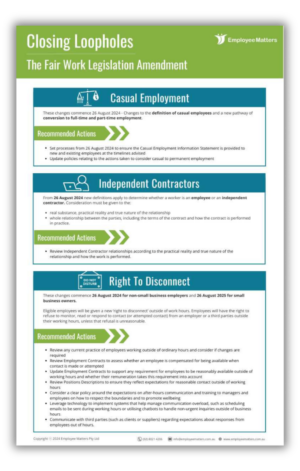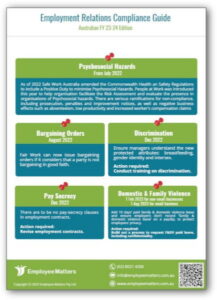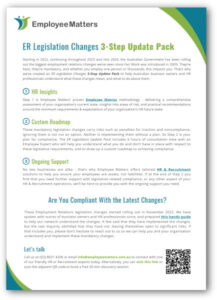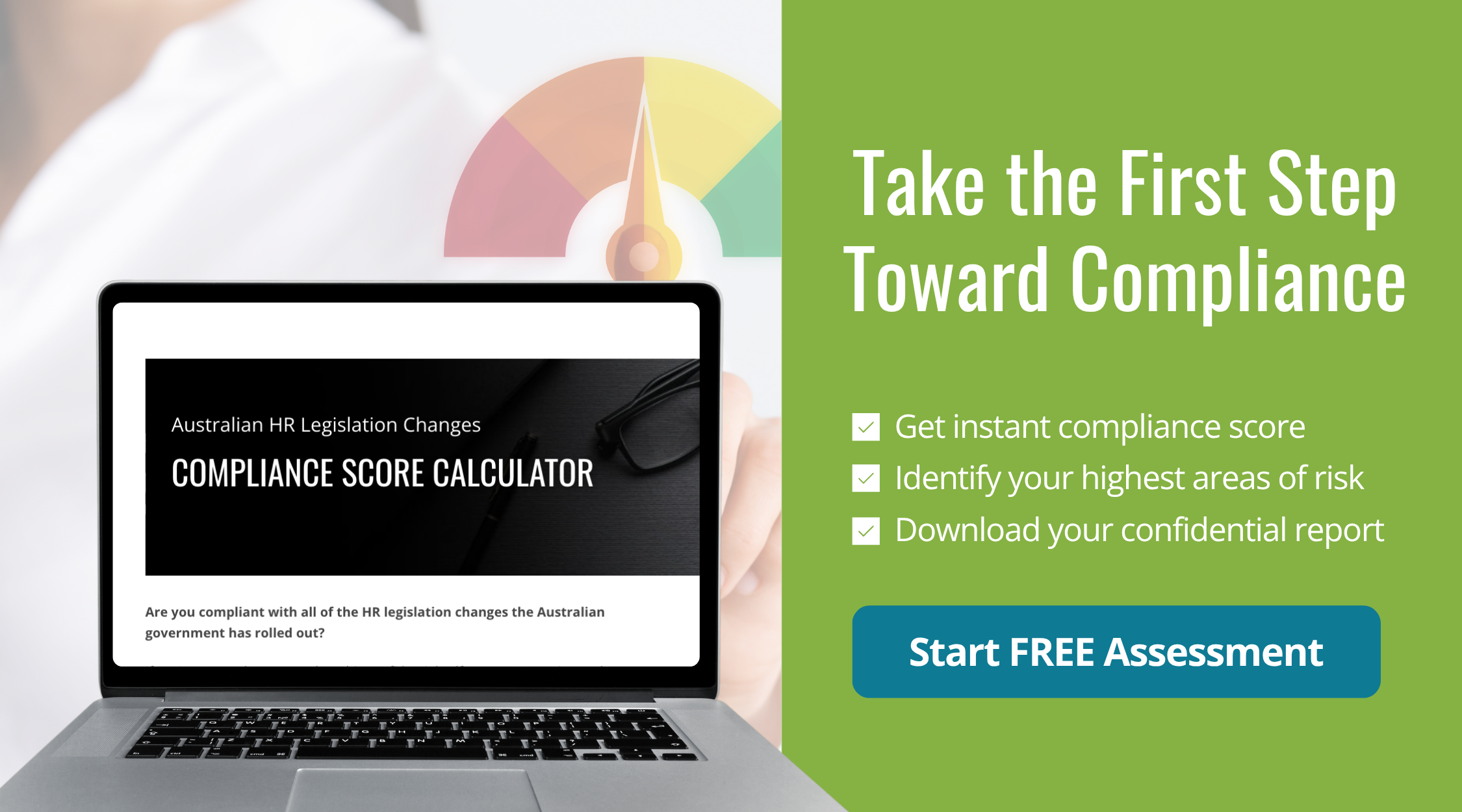By David Brown, General Manager
The first thing we need to acknowledge when discussing an up-to-date and modern approach to disciplinary processes is that there is much that hasn’t changed. For example:
- The right of employees to a fair process including:
- notice of meetings
- the right to bring someone along to support them to a formal meeting
- the right to understand what it is they are alleged to have done or not done
- the right to respond and explain their actions
- The need to make a decision that is fair, just, and not harsh in the circumstances
In other words, the need to treat employees like human beings in coming to a fair decision in terms of their actions and potential shortcomings while protecting your organisation is still your paramount concern as a manager.
What has changed in terms of managing disciplinary issues in the workplace are the tools you have available to you to manage the process quickly, efficiently and fairly. As always, new tools come with great advantages, as well as potential challenges for the unwary. Let’s take a look at what is available to you and how best to use these new tools.
What Has Changed?
While the fundamentals we looked at above are still in place, it's fair to say that almost everything else has changed. How many people ‘write’ a formal ‘letter’ and give/post it to the employee? Or do we compose a message or an electronic document in our chosen system and send it via email or some other internal messaging system? Where do we store these documents; in a ‘filing cabinet’ where accessibility is limited and space is at a premium or electronically where access is secure and instantaneous?
Technology, when used well, has changed the face of how disciplinary processes are enacted and resolved in a way that enhances fairness to employees and therefore lowers the risk to employers. These changes can include:
- Efficiency and speed - Think of the availability scheduling tools, access to each other’s calendars, and instant communications via email or messaging apps such as Slack or Teams, and you can see how this makes the process of meeting to discuss issues simpler and quicker for everyone.
- Record keeping - As we saw earlier, the advantages of electronic record keeping include security of information, accessibility for those who need to see it and privacy to ensure no one else can.
- Reporting and recording - This can include holding meetings over Zoom, Teams or other video conferencing platforms, giving you access to recordings and transcripts of the process itself. In addition, accurate data gathering of the issues can clearly demonstrate where there may be issues and allow you to report on them. This can include electronic timesheets, GPS monitors in vehicles to gather data on safe driving and even and potentially more contentious information such as keystroke logs and login locations.
- Consistency and Fairness - All of the above can lead to a process that is transparent in terms of the information gathered, consistent in terms of the ability to match behaviour and performance against peer group data, and a clear and fair decision making process easily tested against policy.
How Do We Implement Our New Disciplinary Processes?
There is a huge range of systems and platforms available to help businesses maximise the efficiency and fairness of their disciplinary policies and processes. Here are just a few types of platform that can help:
- HR Information Systems (HRIS) - These systems streamline the disciplinary process by providing tools for documentation, case management and workflow automation.
- Employee self-service portals - These portals empower employees to access disciplinary information, submit appeals, and view relevant policies, promoting transparency and engagement.
- Performance management systems - By linking disciplinary actions to performance metrics, organisations can identify performance-related issues and take proactive steps to address them.
- Document management systems - Securely storing disciplinary records electronically ensures easy access and compliance with data-retention requirements.
- Artificial Intelligence (AI) - The potential to automate certain tasks, such as document generation and initial case assessment. Predictive analytics can help identify employees at risk of disciplinary action, allowing for early intervention. All of these, while not necessarily available now, may not be far away.
Challenges
With all new technology comes risk and challenge and this is especially so in the case of disciplinary processes. Remembering the goal of a technologically advanced process is twofold: efficiency and fairness. With this in mind consider the following:
- Privacy - As mentioned earlier, the ability to monitor keystrokes, location, safe use of equipment etc. is already more sophisticated than you may realise. The question is however, just because you can monitor, should you?
- How does monitoring fit in with your culture? Safety monitoring, maybe, but keystrokes may have a whiff of ‘Big Brother is Watching You’ about it. What does this say about a culture of mutual trust for instance?
- What is fair and what is necessary? Is tracking your employees’ every move the right thing to do?
- Communications and employee acceptance - What impact will technology have on your employment relationships, your Employee Value Proposition (EVP), and your ability to attract good people? Some may say that good people have nothing to fear from such systems, but that does not mean your good people will be happy and you do not want that unhappiness to cause your good people to vote with their feet and move on to somewhere less intrusive.
- Cost - There are a plethora of systems and platforms available, but all come at a cost. Your job is to ensure the cost benefit can be realised
- Contingency planning - Electronic information, especially cloud-based information, is increasingly under attack from hackers. Protecting your systems and managing your risk is probably the number one concern for businesses systems today.
Tips on Using Technology to Manage Your Disciplinary Processes
Let’s close by looking at how best to take advantage of technology when updating your disciplinary processes while facing the challenges and managing the risks that come along with the new technology:
- Choose your technology with care - Select systems that align with your organisation's specific needs and budget.
- Communicate clearly - Tell employees the reasons for implementing technology, how it will benefit them, and the safeguards that will be in place. Listen to their thoughts, concerns and ideas, and consider these before implementing any new system.
- Provide comprehensive training - Ensure employees and managers are proficient in using the new technology.
- Regularly review and update - Stay up to date with technological advancements and adapt your systems accordingly.
- Prioritise data security - Implement robust security measures to protect sensitive employee information.
Providing we think carefully about the purpose of the new technology, what will work for both the organisation and the individuals in it, and manage the challenges and risks, then embracing technology and adopting best practices will create more efficient, fair and transparent disciplinary processes. This not only improves employee relations but also helps to mitigate legal risks and enhance overall organisational performance.
Need Help or Just Not Sure Where to Start?
Employee Matters can help you navigate through an enhancement to your disciplinary processes, whether it be through systems, policies & procedures, or both. Book a free discovery session with us now to discuss your unique situation with an experienced member of the Employee Matters team.
Alternatively, you can contact us at:
- Email: info@employeematters.com.au
- Phone: (02) 8021 4206
Your Guide
Access this concise Closing Loopholes Bill summary and guide detailing the proposed changes to the Fair Work Act, and the implications for employers.

Book a meeting with Employee Matters today to find the right kind of outsourced HR & Recruitment service for your organisation’s needs:
Employee Relations Legislation Changes Hub
There is a significant amount of mandatory Employment Relations legislative change that impacts you and every other business in Australia now. Our resource hub is designed to help you understand these wide-ranging changes.

3-STEP UPDATE PACK
Take the first step to be compliant. Our 3-Step Update Pack helps Australian business owners and HR professionals understand what these new ER legislation changes mean and what to do about them.
Step 1 - HR Insights
Step 2 - Custom Roadmap
Step 3 - Ongoing Support

Need HR/Recruitment Support?
Call (02) 8021 4206 or email info@employeematters.com.au to discuss your HR, Recruitment or ER Legislation challenges with an experienced member of the Employee Matters team.
Alternatively, you can book a free call by completing the adjacent form:

